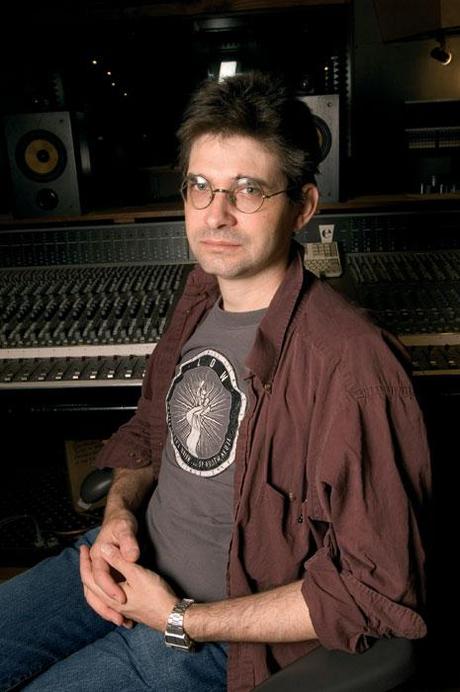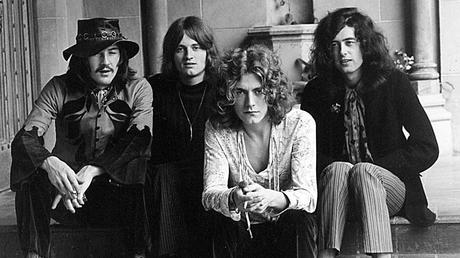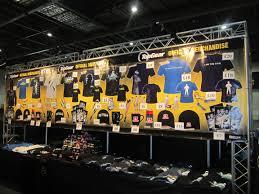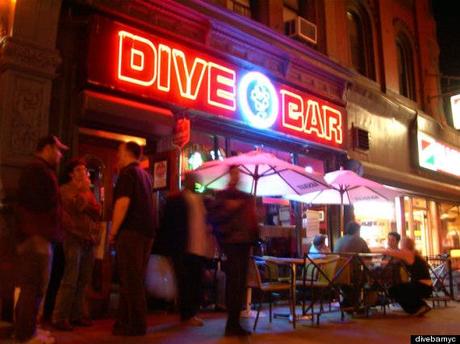We’re not really that fucked. Sure thing seem bleak, and yes, nobody actually buys music anymore, but 15 years or so into the age of piracy, I don’t really get the impression that the industry is going to collapse on itself more than it already has or that we should all get real jobs. The point that nobody seems to want to make about the current state of the music industry is that we’re viewing the past with rose tinted glasses. Whenever we let older musicians talk about the music industry we forget a fundamental aspect behind whatever point they have to make, they were successful then given the complete revolution we’ve had, why should we expect them to be successful now? Maybe it’s just because I’m 18 an think I know everything (Hell, I know I know everything), but all the signs seem to be suggesting that things are actually getting better.
Legendary producer and musician Steve Albini recently said that the internet has solved what he called ‘the problem with music’. A lot of people seemed to think what he was saying was ridiculous, but the more I thought about it, the more I realized he was right. See, we forget that in the past a lot of fairly big name rock bands still worked jobs when they got off tour, or otherwise lived in poor conditions. The thing is that now we’re just more aware of these problems because there’s so much more of everything. In this time more than any other in human history we have tons of touring bands and as a direct result of that we, as fans, are more likely than ever to be friends, or at least acquaintances, with someone in a touring band. Suddenly, the basic problem of poverty that musicians have faced for years becomes a lot more clear.

The fact of the matter is that nowadays, with the internet, bands have more reason to stick around. While in the 80s a band might go through a handful of incarnations before getting signed or breaking up, nowadays bands can immediately find their market or at least have the hope of finding the three or four other bands in the world who fit their niche and working with them to grow their respective fanbases. Though the concept of a ‘superstar’ may be dying, suddenly a lot of that money and interest is being expanded to independent artists (Which is part of why it’s more important than ever to have a promoter or an agent) So suddenly, being an independent artist is more viable than ever, but that still doesn’t mean it’s very viable. People in the Western world, in America especially seem to have this twisted sense of entitlement, that they as ‘artists,’ whatever that’s supposed to mean, are not supposed to work. If every person who I knew trying to get a job in the music industry got one, then this would be literally the biggest industry on earth. Sadly it is not, and most of the people who try to get jobs in this industry are, frankly, usually lazy stoners, which nowadays, given the level of work and dedication required, makes working in this industry harder than ever.
There’s a couple things you have to consider when making an argument that it’s still possible to make money off of music. First off, technically it is fairly feasible for a mid level band with around 20,000 Facebook fans to not have to get real jobs in the conventional sense. Admittedly this means they need to tour up ten months a year, but it’s still technically possible, it just won’t be easy. Bands like KEN Mode prove this, they’ve figured it out such that they only really tour 6-8 months a year most of the time, but still don’t need real jobs. But think about it this way, what other job would you expect to only have to work a couple months a year and still make a decent living? Going on tour is brutal and profits are small, that’s why if you want to make money off it you have to do it a hell of a lot. It’s like any other low paying job, but that being said, you get to play in front of a whole new crowd of fans every night, and really, who doesn’t want that? The best job in the world has to have some downsides right? Anyway, for now at least it seems like touring is the only way to make any sort of real living purely as a musician.

This brings up another big issue in the music industry, getting kids to go to shows. But, again, you have to remember, that’s always been a problem! Sure, Led Zeppelin played to thousands every night, but guess what, your unsigned rock band is not Led Zeppelin! In fact, if any band today were to be compared to Led Zeppelin in terms of revenue it would probably be some butt rock act that you probably hate. For years people who are ‘all about music’ have not been going to shows for small independent bands, you know why? Because people don’t understand the fundamental beauty of live music from bands they’ve never heard of, and that is a problem I’m not entirely sure how to solve. The only thing that I could see working would be some sort of independent chain of venues that host underground shows and that had a big enough name to be trusted by fans of all ages. Maybe if Starbucks started hosting live shows regularly that would be a step in the right direction, or perhaps the expansion of these programs where you pay a flat fee every month to go to as many concerts as you want. But at this point, I’m still just spitballing.
See, the audience for music is still there and if anything it has only grown. The issue is that people don’t want to consume it in any tangible way. A digital product is essentially intangible and the revenue stream from recorded music needs to be forgotten if you’re lucky it can cover the cost of your webstore and that’s about it. I don’t care how good you are, you’re not making serious money with music sales anytime soon. That being said, there are all sorts of good things you can do to continue to profit, this is a problem that’s been faced (in a different form) in the past and will be faced (in a different form) in the future. For example, limited runs of CD’s will always be in demand, especially for smaller name bands. You might not be able to sell thousands of your albums on a national level, but if you have any sort of local renown, selling 50 to 100 copies of your album on CD shouldn’t be too hard. This can provide a nice little starting point for your band to generate revenue for more merchandise, which can hopefully later on fund tours.

I don’t have all the answers, but I just want you to consider this. A lot of people will say “Oh, nowadays you can only get rich off music if you’re in the top .1% of bands” or something to that effect. Here’s the thing though, the bands that have survived through the ages, and whose antics you read about, the guys who were on the cover of Rolling Stone, those are the top .1% of bands! Sure you might be into some more obscure acts like Blue Cheer or Budgie, but guess what? Those guys still had jobs and lived in houses with upwards of twenty other people! In fact, with the revamped success of independent bands, you’re actually a lot better off as a small name act today than in the 70s. This is where the sense of entitlement comes in. Musicians of times past may have had another revenue stream in the form of vinyl, cassettes and later CD’s, but life still was hard for them. Yes, the job market is brutal, especially for the lower level jobs that touring musicians tends to take on, but that’s just a bleak reality. Do you think the first Black Sabbath album would have been as good if Ozzy wasn’t working in a slaughterhouse while some of the songs were being written? Being poor an hungry is what has fueled the fire in the bellies of musicians for centuries.
Perhaps a better title for this article would be “Albini Was Right: We’re Fucked, but No More Fucked Than We Ever Were” Musicians have more of a chance to make it as independents now, but they also have to deal with the general lack of revenue that comes from all media being available for free online. So yeah, trying to be a full time musician sucks and will probably see you working 70-80 hours a week for what comes out to be be below minimum wage, but that’s your choice. If you want to live comfortably, don’t be a full time musician. There are other things you can do in the music industry that make you a fair bit of money, but life has always sucked for musicians and it always will. That’s why you shouldn’t be getting a music degree if you don’t know exactly what you want to do with it. For those of us who want to spend our lives in dive bars and punk houses, good, for the others, not so much. Remember, you will almost certainly never be famous, and you shouldn’t expect to be. That should not be your way out of a life your are unsatisfied with.

With the death of the superstar and the fall of physical media we are entering a new phase in musics history that is almost reminiscent of a time from before recording technology existed. For years the great American composer J. Phillip Sousa was against his symphonies being recorded because he was afraid people wouldn’t go see them live anymore and he would lose money. Well now we’re at a time were everything is always recorded, whether we like it or not, so we have to do our best to create something that is worth going out to see.

This is essentially what I view was the third phase of post medieval music. First we had only live performances with no recordings and it persisted this way for centuries, the only people who really made a living off music were famous composers and musicians who played every single night and who probably worked on farms and the like when there was a low demand for music (Usually whenever the relevant ruler was in court elsewhere). Then we had recordings that could be used for profit alongside live shows for most of the 20th century. This led to bloated rock stars we still read about, and who for some reason we all think, myself included, we can imitate. And then we come to today, where the recordings are almost assumed. We have no other choice than to make money off of innovative merchandise and exciting live shows. This is the twisted reality we live in, but I think the reality has always been twisted, it’s only now that our sense of entitlement has us putting up a serious fuss about it.
I don’t know what will bring us out of this current era of music. Maybe live shows will be broadcast cheaply (or, let’s be honest, for free) as holograms across the world. I think though, that for a certain segment of the population there will never be an alternative to standing in a sweaty club that reeks of beer and cigarettes as your favorite band (or hell, even a band you’ve never heard of) give their all a few feet in front of you. Some of us will never concede what is ‘real’ and truly authentic, especially in an increasingly digitized age. Things are good now, perhaps better than ever for independent artists, and they could get worse, or they could, somewhat miraculously, get better. That’s not my place to judge. All that I can say is that for now, there are still opportunities there for you if you just go for it. Embrace the primal poverty forced upon you as a musician and use that to fuel your music. We all know music usually becomes decadent and dull when it comes from the rich, there’s a reason underground music was always was tied in with lower class fans and musicians. There will always be ways to survive off the underground, it may not be easy, but know this, though the night may be dark and full of terrors, there is a light at the end of the tunnel, and with enough work and dedication you can make money in the music industry. We may be fucked, but it’s not as bad as we think.
As featured on Indie-music.com, Examiner.com, I Am Entertainment Magazine, Antimusic.com, and recommended by countless music publications, “Your Band Is A Virus! Expanded Edition” is the ultimate music marketing guide for serious independent musicians and bands. Get your copy now.

